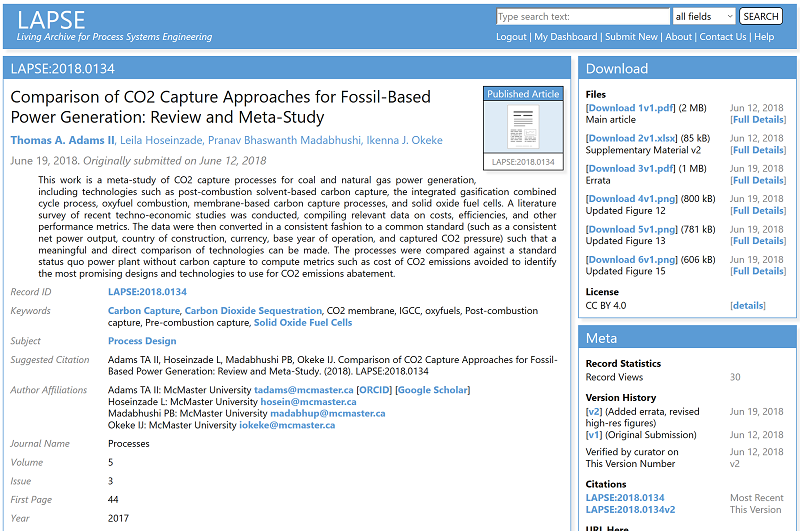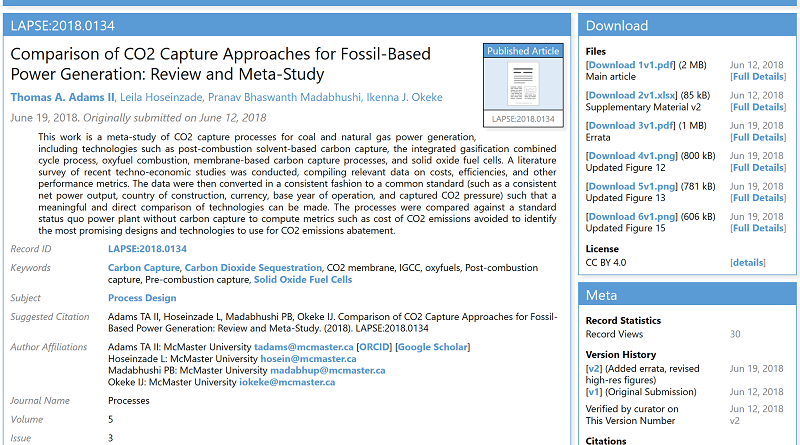LAPSE: The Living Archive for Process Systems Engineering

LAPSE is an open-access archive dedicated to fostering open-access to research and educational materials in the process systems engineering community. Users are encouraged to use LAPSE to deposit:
- Pre-prints of research articles
- Post-prints of research articles
- Publisher versions of open-access research articles
- Conference presentations
- Course materials
- Lecture slides
- Technical white papers
All submissions are given a unique LAPSE ID, such as LAPSE:2018.0134 that resolves to your record. You can cite a LAPSE ID like you would cite a DOI. LAPSE records can be located with a permalink URL like:
https://psecommunity.org/LAPSE:2018.0134
[Find out more about citing, resolving, and using LAPSE IDs]
Why use LAPSE?
LAPSE was created at the request of PSE community members who wanted open-access archive options for the PSE field that provides more than just a place to put files. LAPSE has features which are unique to other repositories for other fields, such as:
- Record Maps. In LAPSE, you can link your deposits to other records in LAPSE, submissions to arXiv, or any thing with a DOI. Common uses include:
- Linking your pre-print or post-print to the final print version on a publisher’s website
- Linking a research article to a record containing data, source code, models, etc. used as a part of that research
- Linking major works together conceptually, such as linking a Part I research article to a followup Part II article.
- Constructing a map of an entire research program, showing how many research articles correspond conceptually and chronologically.
- Connecting lecture materials with the research on which it was based.
- Embargos. In LAPSE, you can set an embargo date on submissions, such that record will not appear to the general public until a certain date. This is particularly useful because many journals have embargo restrictions on post-prints. Rather than remembering to wait until a certain day in the future (often one to two years after the date of publication) to submit your post-print, you can submit it at any convenient time after it has been accepted and simply set the date you want it to appear.
- Useful Journal Database. By working with major publishers, we have created a database of journals relevant to PSE that contain useful information such as:
- Eembargo periods that vary by type (pre-print, post-print, or final published version)
- Licensing requirements for pre-prints and post-prints (for example, which Creative Commons license should be chosen)
- Legal text that must accommodate submissions
- See [Copyright Management] for information about how we help authors adhere to copyright.
- Automatic Header Generation: LAPSE automatically generates a header page on PDF submissions for pre-prints, post-prints, and published versions of articles. This is important because some journals require header pages with particular legal text in order to submit to an archive without violating copyright terms. If your journal is in our database, LAPSE automatically generates this legal text for you.
- Links to the PSE Technology Tree. (Coming soon). Connect your LAPSE record to the PSE Technology Tree Wiki by choosing the wiki page entry most pertinent to your work. The end of each technology page contains a list of LAPSE records related to the page. This is a great way for visitors to the Wiki to find relevant research on the topic in LAPSE.
Registrations
LAPSE is a member of the Directory of Open Access Repositories (OpenDOAR)
Past and Current Funders
LAPSE is supported financially by the PSE research and education community, and thank our funders:
![]() *
* ![]() +
+![]()


* supported by the CAST division of AIChE
+ supported by the Systems & Control Division of CSChE
Volunteers Needed
LAPSE is an activity of the Canadian Society for Chemical Engineers and is non-profit. We are looking for volunteers to help. To find out how, see our Contribute page.

